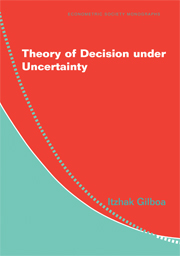Book contents
- Frontmatter
- Contents
- Preface
- I Intuitive Definitions
- II Behavioral Definitions
- 6 A Case Study
- 7 The Role of Theories
- 8 Von Neumann–Morgenstern's Theorem
- 9 De Finetti's Theorem
- 10 Savage's Theorem
- 11 The Definition of States
- 12 A Critique of Savage
- 13 Objectivity and Rationality
- 14 Anscombe–Aumann's Theorem
- III Alternative Behavioral Theories
- IV Cognitive Origins
- References
- Index
- Titles in the series
12 - A Critique of Savage
Published online by Cambridge University Press: 05 January 2013
- Frontmatter
- Contents
- Preface
- I Intuitive Definitions
- II Behavioral Definitions
- 6 A Case Study
- 7 The Role of Theories
- 8 Von Neumann–Morgenstern's Theorem
- 9 De Finetti's Theorem
- 10 Savage's Theorem
- 11 The Definition of States
- 12 A Critique of Savage
- 13 Objectivity and Rationality
- 14 Anscombe–Aumann's Theorem
- III Alternative Behavioral Theories
- IV Cognitive Origins
- References
- Index
- Titles in the series
Summary
Savage's “technical” axioms, P6 and P7, have been discussed in Chapter 10. They are not presented as canons of rationality, rather as mathematical conditions needed for the proof. We therefore do not discuss them any further.
There is also little to add regarding axiom P5. It is worth emphasizing its role in the program of behavioral derivations of subjective probabilities, but it is hardly objectionable.
By contrast, P1–P4 have been, and still are, a subject of heated debates, based on their reasonability from a conceptual viewpoint. We start the discussion with P3 and P4. We will attempt to delineate their scope of applicability as clearly as we can, briefly discuss alternatives, and move on. Only then will we get to P1 and P2. The problems with these axioms will motivate the discussions that follow.
CRITICIZING CRITIQUES
It may be useful to agree what constitutes a violation of an axiom and when we would like to retain an axiom despite what appears to be a violation thereof. This will also serve as an example of an application of the discussion in Section 7.2.
An Example
Consider the IIA (independence of irrelevant alternatives) axiom in consumer theory. You probably know it from Mas-Colell et al. (1995) or from Kreps (1988). It is stated in the context of a choice function, mapping nonempty sets of alternatives, A, to nonempty subsets of themselves, C(A) ⊂ A.
- Type
- Chapter
- Information
- Theory of Decision under Uncertainty , pp. 123 - 137Publisher: Cambridge University PressPrint publication year: 2009



